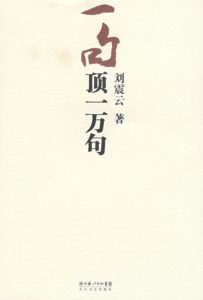Someone to Talk To
一句顶一万句
China, 2016, colour, 2.35:1, 103 mins.
Director: Liu Yulin 刘雨霖.
Rating: 7/10.
Ironic provincial drama of everyday marital problems marks an impressive feature debut by the daughter of well-known writer Liu Zhenyun.
Yanjin county, Xinxiang municipality, northern Henan province, China, the present day, winter. Ten years after marrying, Wu Aiguo (Mao Hai) and Pang Li’na (Li Qian) have a young daughter, Wu Beihui (Liu Nuonuo), but their marriage is under strain. Formerly in the army, Wu Aiguo is a cobbler; Pang Li’na works in the local textile factory. He collects their daughter from school and then meets his wife at the factory gate, but she says she’s going out with a friend. His elder sister, Wu Aixiang (Liu Bei), 39, who runs a flatbread stall, tells him there are rumours that Pang Li’na likes wedding photographer Jiang Jiu (Yu Entai). Angry and threatening to “kill someone”, Wu Aiguo goes to see old army friend Du Qinghai (Zhang Jie), who calms him down and urges him to talk to his wife and share interests. At home Wu Aiguo cooks Pang Li’na a nice dinner and tries to talk, but she denies having an affaire with Jiang Jiu. She later tells Wu Aixiang that her friendship with Jiang Jiu is more about having someone to talk to about everyday things. Pang Li’na tells Jiang Jiu that their friendship must stop, and then abruptly goes on a cheap factory outing to Suzhou for five days. Wu Aiguo discovers Pang Li’na has gone to meet someone at a hotel in neighbouring city Xinxiang; after waiting outside all night he sees her and Jiang Jiu leaving in the morning. He then buys a knife. Back home, Wu Aiguo tells Zhao Xinting (Qi Xi), Jiang Jiu’s wife, about the affaire. Zhao Xinting tries to commit suicide by drinking pesticide but survives; in hospital Jiang Jiu promises her a fresh start, but she is still distraught after leaving. Wu Aiguo offers a deal to Pang Li’na: he will divorce her if she can get Jiang Jiu to divorce Zhao Xinting; in return Pang Li’na is never to see her daughter again. Pang Li’na says she actually went to meet Jiang Jiu at the hotel to end their friendship. To explain Pang Li’na’s absence, Wu Aiguo tells his daughter that she’s gone to Guangzhou to look for work. Meanwhile, Song Jiefang (Fan Wei), 48, a widowed chef, makes a marriage proposal to Wu Aixiang via a matchmaker. She accepts – more to have “someone to talk to”, as she tells Wu Aiguo – and the pair have a splashy wedding. In the meantime, Jiang Jiu and Zhao Xinting have got together again, so Wu Aiguo’s plan amounts to nothing. Then one day Pang Li’na, who’s been in town the whole time, secretly approaches Song Jiefang to give her daughter a toy, but to pretend it’s from him, not her. After that, everything starts to go wrong again on all fronts.
REVIEW
Not many first-time directors get to direct a script written by their famous novelist dad, but such is the case of Liu Yulin 刘雨霖 with Someone to Talk To 一句顶一万句, an ironic drama about lack of communication and the need for companionship that’s an impressive feature debut on any level. The daughter of writer Liu Zhenyun 刘震云 – several of whose works have been directed by Feng Xiaogang 冯小刚 (Cell Phone 手机, 2003; Back to 1942 一九四二, 2012; I Am Not Madame Bovary 我不是潘金莲, 2016) – and a graduate of Beijing’s Communication University of China and New York’s Tisch School of the Arts, she previously directed the 24-minute short Door God 门神 (2014), about a young village girl waiting for her mother to return home. Someone, however, is on a considerably more complex level: strongly cast in depth, and directed with great economy, it’s let down by a soapy finale but otherwise keeps an admirable brake on the characters’ swirling emotions. Once a mainstay of Mainland cinema, this kind of unsplashy drama, set among average people, is increasingly consigned to TV, so it was hardly a surprise that theatrical box office was a meagre RMB21 million.
 Though it shares the same Chinese title as Liu Zhenyun’s 2009 novel One Sentence Is Worth Ten Thousand 一句顶一万句 (see left), the film is pretty much a separate work, inspired by just a few elements in the book’s second half, and notably its lead character Wu Aiguo. (Reportedly, the genesis of the project was in 2014, when Liu Yulin called her father from the US and said she wanted to adapt a section of the novel into a film.) The setting is Yanjin county, part of Xinxiang municipality in northern Henan province – the birthplace of both Liu and his daughter – and the main characters are an ex-army cobbler and a worker in a textile factory whose marriage is starting to crumble after 10 years. The basic problem, as one of the husband’s pals points out, is lack of everyday communication and shared interests; but these are not career-obsessed, metropolitan yuppies, just average provincial people. The wife has forged a close friendship with a married wedding photographer – not so much an affaire, more having “someone to talk to”. Meanwhile, the husband’s elder sister accepts a marriage proposal from a widowed chef – for the same reasons, as she’s getting on and her parents are both dead.
Though it shares the same Chinese title as Liu Zhenyun’s 2009 novel One Sentence Is Worth Ten Thousand 一句顶一万句 (see left), the film is pretty much a separate work, inspired by just a few elements in the book’s second half, and notably its lead character Wu Aiguo. (Reportedly, the genesis of the project was in 2014, when Liu Yulin called her father from the US and said she wanted to adapt a section of the novel into a film.) The setting is Yanjin county, part of Xinxiang municipality in northern Henan province – the birthplace of both Liu and his daughter – and the main characters are an ex-army cobbler and a worker in a textile factory whose marriage is starting to crumble after 10 years. The basic problem, as one of the husband’s pals points out, is lack of everyday communication and shared interests; but these are not career-obsessed, metropolitan yuppies, just average provincial people. The wife has forged a close friendship with a married wedding photographer – not so much an affaire, more having “someone to talk to”. Meanwhile, the husband’s elder sister accepts a marriage proposal from a widowed chef – for the same reasons, as she’s getting on and her parents are both dead.
The script develops various petty dramas and disagreements around this common problem and those of other characters with an ironic, almost blackly comic eye that never becomes outrightly humorous. There’s never any shortage of plot as the various balls bounce around the table, but Liu’s writing is always concise in showing the way relationships change and develop, such as the rapid degeneration of the marriage between the elder sister and the chef, or the way in which the wife’s close friend repairs his own marriage and therefore changes the dynamic between the wife and her husband.
Casting is terrific at all levels, from the husband and wife of Mao Hai 毛孩 and Li Qian 李倩 (the adult leads in Door God) to the cook of veteran comedian Fan Wei 范伟 (equally adept in serious roles), elder sister of Liu Bei 刘蓓 and the photographer’s wife of Qi Xi 齐溪. Director Liu, 30 at the time of shooting, crewed her film smartly, with the widescreen photography of experienced d.p. Wu Di 邬迪 (a regular of director Wang Xiaoshuai 王小帅) having a no-gloss everyday look and unobtrusive, flowing style, and the chamber scoring by composer Gong Tianpeng 龚天鹏 admirably discreet in the second half. Editing by Zhong Yijuan 钟义娟 (China Affair 她们的名字叫红, 2013) is similarly smooth.
CREDITS
Presented by Old Western Village Pictures (CN), Fun Show Culture Communication (Beijing) (CN), Beijing Wevining Technology (CN), Beijing Tugu Culture Communication (CN), Huaxia Film Distribution (CN), Huaxia Film (Beijing) (CN). Produced by Old Western Village Pictures (CN).
Script: Liu Zhenyun. Novel: Liu Zhenyun. Photography: Wu Di. Editing: Zhong Yijuan. Music: Gong Tianpeng. Art direction: Zhang Jietao. Costume design: Zhang Ke. Sound: Zhao Ying, Liu Jia. Executive direction: Zhang Jie.
Cast: Mao Hai (Niu Aiguo), Li Qian (Pang Li’na, Niu Aiguo’s wife), Liu Bei (Niu Aixiang, Niu Aiguo’s elder sister), Fan Wei (Song Jiefang, widowed cook), Liu Nuonuo (Niu Beihui, Niu Aiguo’s daughter), Qi Xi (Zhao Xinting), Yu Entai (Jiang Jiu, Zhao Xinting’s husband), Sun Qian (Zhang Chuhong, Niu Aiguo’s old college classmate), Zhang Jie (Du Qinghai, Niu Aiguo’s army friend).
Premiere: Busan Film Festival (New Currents), 10 Oct 2016.
Release: China, 4 Nov 2016.
